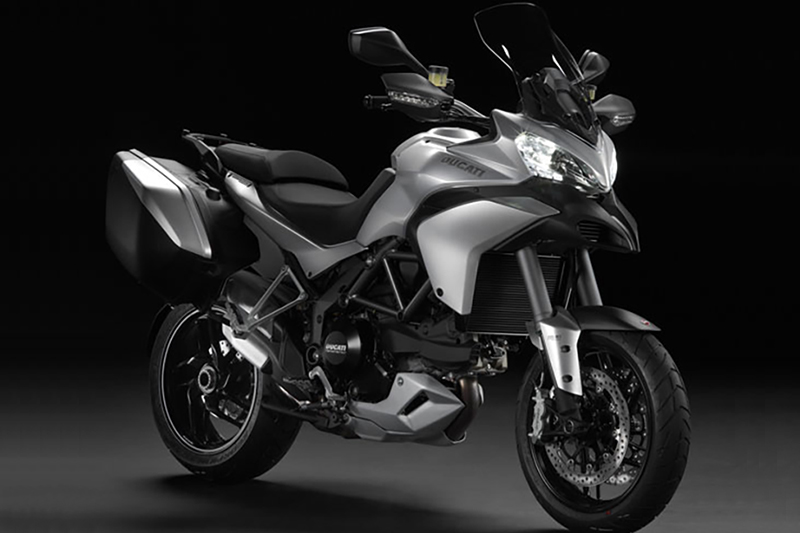2013 Ducati Multistrada 1200 S Touring

First Ride Review
Since its 2010 revamp, the Ducati Multistrada 1200 has been busy. It became king of Pikes Peak (spawning an eponymous model version), it helped keep the lights on during the economic downturn (thanks to sales of 20,500 units) and it grew the ranks of Ducatisti. Four out of five Multistrada buyers are first-time Ducati owners, and they tend to be older and rack up more miles than others.
Ducati’s reboot of the do-it-all Multistrada has improved its touring capability and user-friendliness. To help the liquid-cooled, 1,198cc Testastretta 11˚ L-twin run more smoothly and efficiently, it got a dual-spark head, repositioned fuel injectors, a secondary air-injection system and revised engine mapping. Ducati says fuel economy is better and torque is up by 5 percent (91.9 lb-ft at 7,250 rpm—a 4.3 lb-ft gain), with claimed horsepower holding steady at 150 at 9,250 rpm.
For 2013, the Multistrada lineup includes a base model and three S models—Touring, Pikes Peak and the all-new Granturismo. All are equipped with the Ducati Safety Pack, which includes 8-level Ducati Traction Control (DTC) with smoother intervention than before and ABS that now has three modes and is linked front-to-rear. And all feature the four Riding Modes (Sport, Touring, Enduro and Urban) introduced in 2010, with pre-selected settings for engine output/throttle response, DTC, ABS and—on S models—Ducati Skyhook Suspension.
Replacing the Öhlins-built Ducati Electronic Suspension, DSS is a semi-active system made by Sachs that’s designed to keep the bike stable, as if it “was suspended from the sky.” Whereas conventional suspension behaves in a fixed manner based on its settings, DSS continuously evaluates inputs from front and rear accelerometers, a throttle position sensor and the ABS control unit, and automatically adjusts compression and rebound damping via electronic valves. Each Riding Mode has its own “zero point” setting, and the system can be further personalized for firmness and rear preload. DSS-equipped models have electronic CDCi valves in the left leg of the 48mm male-slider fork (manual preload adjustment is in right leg) and in the rear shock, with 6.7 inches of travel front and rear and a dual-rate rear spring to help prevent bottoming.
Our test ride in Bilbao, Spain, was limited to the best-selling S Touring model, sporting new matte chrome paint and updates common across the Multistrada line, including LED low-beam headlights and position lights, a larger front storage compartment and updated instrumentation. The windscreen is taller, wider, and now offers “pinch-and-slide” one-hand height adjustment. In addition to two 12V power outlets, there’s now a connector for the optional Garmin GPS. And new cast-aluminum wheels have a 10-spoke design similar to those on the 1199 Panigale (the Pikes Peak gets forged Marchesini wheels).
The Multistrada 1200 is the sportiest of the open-class adventure tourers, offering more power and less weight than others in the class, but not at the expense of comfort. Ergonomics are unchanged, with well-placed handlebars and footpegs and a firm, supportive seat. The second-generation Testastretta 11˚ engine felt noticeably smoother, especially at lower rpms, without dulling its steroidal personality. Switching between Riding Modes can be done on the fly. Touring mode is the most versatile, offering full power with mild throttle response. Sport mode sharpens throttle response, while Urban and Enduro reduce engine output to 100 horsepower with mild throttle response. Each mode sets DTC and ABS to appropriate levels, and both can be deactivated.
Regardless of mode, the S Touring was well behaved, with minimal chassis pitch and good damping. What was hard to pinpoint, however, was the semi-active component of suspension action. According to David James, Ducati’s international press manager, that’s the point: “DSS is supposed to be seamless, like a well-designed traction control system.” Maybe so, but the new setup felt somewhat numb relative to its Öhlins-equipped predecessor. We’ll reserve final judgment until we can do a more thorough road test.
